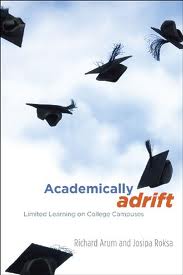 Reports about Richard Arum and Josipa Roksa’s Academically Adrift: Limited Learning on College Campuses are burying the lead or omitting it all together. Â At a time when the humanities are under attack, this book reveals that humanities majors are learning more than all other majors. Â You read that correctly. Â The students who are acquiring the most knowledge from their college educations are those who major in English, Philosophy, Music, Fine Arts, Religion, History, Theatre, and Modern Languages:
Reports about Richard Arum and Josipa Roksa’s Academically Adrift: Limited Learning on College Campuses are burying the lead or omitting it all together. Â At a time when the humanities are under attack, this book reveals that humanities majors are learning more than all other majors. Â You read that correctly. Â The students who are acquiring the most knowledge from their college educations are those who major in English, Philosophy, Music, Fine Arts, Religion, History, Theatre, and Modern Languages:
Students majoring in liberal arts fields see “significantly higher gains in critical thinking, complex reasoning, and writing skills over time than students in other fields of study.” Students majoring in business, education, social work and communications showed the smallest gains. (The authors note that this could be more a reflection of more-demanding reading and writing assignments, on average, in the liberal arts courses than of the substance of the material.)
That’s from Scott Jaschik’s piece in Inside Higher Ed, one of the only articles to even mention this important victory for the humanities. Â True, it’s not the lead, and the parenthetical diminishes the importance of the subject. Â (That final sentence makes the absurd claim that the humanities have both “more-demanding reading and writing assignments” and somehow less “substance.” Â What?) Â Their apparent anti-humanities bias aside, Arum and Roska’s study brings good news for those of us who value the humanities.
Why, then, do the Chronicle of Higher Education, the New York Times, and others fail to mention the fact that humanities majors are learning more than their colleagues in other fields? Â Why are the headlines “University students learn next to nothing” (Macleans) or “New Study Confirms the Obvious: First Two Years of College Spent Sleeping and Partying” (Vanity Fair)?
There are many reasons, all of which have been stated elsewhere with greater eloquence. Â (For those who wish to skip a summary of the obvious, jump past this list to the next paragraph.) Â Some reasons include:
- Americans’ anti-intellectualism. Â Most Americans distrust the well-educated, and consider knowledge with suspicion. Â To point to but one recent example: For the past decade, The Today Show has featured the winners of the Caldecott and Newbery Awards. Â This year, on the first show after the awards were announced, Today‘s featured guest was Snooki. Â The winners have yet to appear on the program.
- The widely held notion (by many state legislatures, at any rate) that college is a waste of the public’s money.
- And, of course, cultural prejudice against the humanities. Â English majors: how often do your relatives ask you what you’re going to do with that degree? How many of your classmates ask why you need a B.A. in English to ask “Do you want fries with that?” How many Engineering majors get asked the same questions?
All of the above are either false or based on false premises. Â If you’re able to think critically about the world, you’re less likely to be misled (by, say, politicians who claim that we “can’t afford” to fund public education adequately). Â If you gain a college degree, you’ll have a better chance at finding gainful employment. Â And, as for the notion that humanities majors enter the job force ill-equipped, that’s simply nonsense.
To focus on the students I teach, English majors go on to become librarians, screenwriters, teachers, technical writers, lawyers, journalists.  They work in non-profits, publishing, advertising, public relations.  One former student of mine works for Hallmark.  You can do a lot with a degree in the humanities. As Geoffrey Galt Harpham writes, “the humanities elicit and exercise ways of thinking that help us navigate the world we live in. For my money, that’s about as essential as it gets.”  To be a student of the humanities is to consider with greater nuance and deeper understanding just what it means to be human.  What could be more important than that?

kerry
Joanne
Jonathan Auxier
Philip Nel
Skip Knox
Les
Pingback: Academically Adrift? « The UNE Historians' Notebook
Chuck
Philip Nel
cassamandra
Jonathan Coker
FD
Humanist
Jayna
Charley
Pingback: Students Found Missing pt I | My Ongoing Struggle with Misanthropy
Pingback: Unemployment by College Majors Examined Alongside that CLA “Academically Adrift” Followup Study | Rortybomb
Dan
Pingback: In which the author composes a manifesto for English… « To Delight and to Instruct
Pingback: In which the author composes a manifesto for English Studies… « To Delight and to Instruct
Pingback: Are Canadian students learning anything? - Macleans.ca
Pingback: Against Utility – christopher b. wachal
fargo kantrowitz